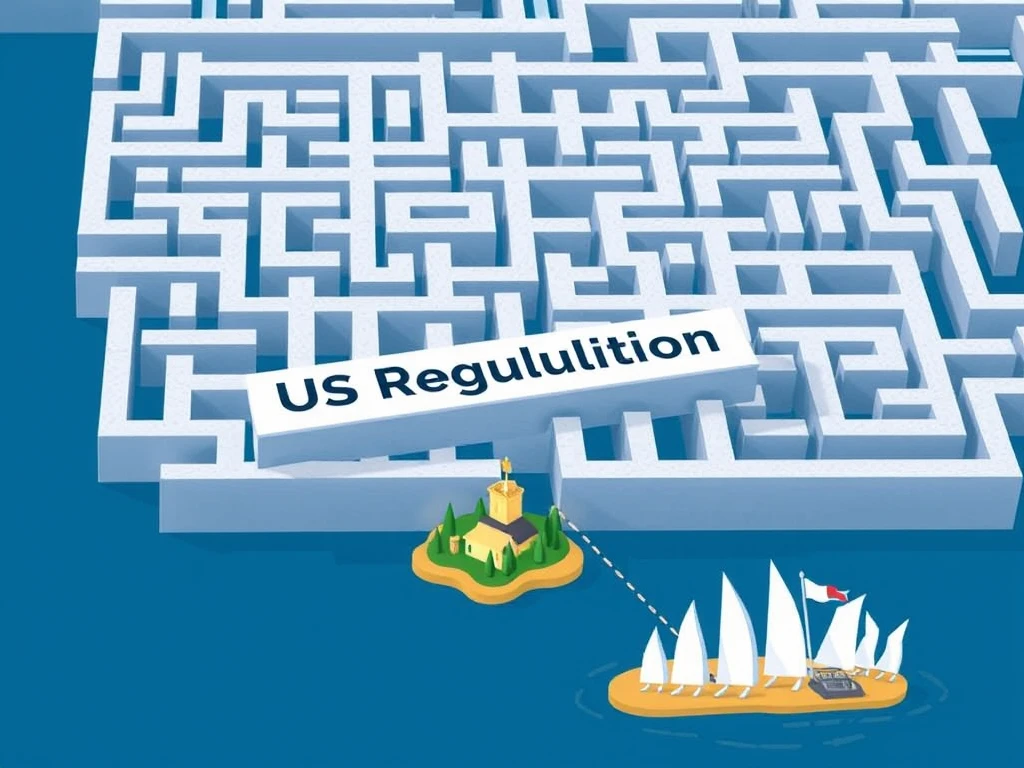US Crypto Regulation: Why America is Failing Crypto (But Can Fix It)

Are you involved in the crypto space, perhaps even thinking about launching a project? If you’re in the United States, you likely already know the hurdles. The dream of a thriving US crypto renaissance is facing significant challenges. Despite claims of being crypto-friendly, the current environment makes launching crypto projects incredibly difficult, pushing innovation and investment away from American shores. This isn’t just a minor inconvenience; it’s a critical issue impacting America’s potential leadership in the global digital economy.
Understanding US Crypto Regulation Challenges
For years, navigating US crypto regulation has felt like traversing a complex maze. The core problem lies in a lack of clear rules and a reliance on enforcement actions rather than defined guidelines. This uncertainty creates a hostile environment for innovators.
A major bottleneck is the application of the Howey test. Developed for traditional investment contracts, this test is often used by the SEC to classify nearly every new crypto token as a security. The issue is that most crypto projects need to launch a token to achieve decentralization, a state that ideally removes them from security classification. However, launching the token in the US under the current interpretation instantly puts them at regulatory risk. It’s a self-defeating cycle: projects need to decentralize by launching a token, but launching a token makes them subject to regulations that assume centralization.
This regulatory pressure has tangible consequences:
- Liquidity providers hesitate to support US-based token launches due to security classification fears.
- Centralized exchanges often refuse to list tokens issued by US entities.
- Even decentralized exchanges face legal pressure to avoid supporting American projects actively.
The outcome is that US founders are severely limited in their ability to participate in the global crypto economy from their home base.
Why Crypto Projects Offshore are Winning
The difficult US regulatory climate has directly led to a surge in crypto projects offshore. Jurisdictions like Switzerland, the Cayman Islands, and the British Virgin Islands have become popular destinations. These places offer more predictable legal frameworks or corporate structures that allow projects to operate with less regulatory risk.
Switzerland, for instance, provides a structured system for obtaining legal clarity on a token’s classification. While the core development and talent often remain in the US, the legal entity for token issuance is established overseas, often through non-profit ‘Associations’ or ‘Foundations’. This forces American founders to incur extra costs on legal fees, offshore operations, and complex structures, all to avoid US regulatory hurdles. This isn’t just inefficient; it means the US loses out on potential tax revenue, investment, and influence in a rapidly growing industry.
The Urgent Need for Regulatory Clarity
Despite recent political rhetoric suggesting a shift towards a more crypto-friendly stance, concrete actions providing regulatory clarity have been slow to materialize. Simply promising tax breaks isn’t enough; the fundamental regulatory landscape needs reform. The US needs to acknowledge that applying regulations designed for traditional finance directly to crypto doesn’t work.
A new, functional legal framework is essential. This framework must recognize that crypto tokens typically require a period of development and growth before achieving full decentralization. The government should revise the Howey test or create a new standard that allows tokens a grace period to decentralize without automatically being classified as securities from day one. Alongside this, clear rules are needed to prevent insider abuse during this initial phase.
Furthermore, the approach of ‘regulation by enforcement’ must end. Market participants, including market makers, need clear, stable guidelines to determine whether a US token is a commodity or a security. This predictability is crucial to lift the blanket bans currently affecting US tokens and encourage crypto development back in America.
Establishing a Modern Token Launch Framework
To truly lead, the US must establish a modern token launch framework. This framework should provide a predictable path for projects to issue tokens, outlining clear requirements and milestones for achieving decentralization. It should balance investor protection with the need for innovation.
Key elements of such a framework could include:
- Defined stages for token development and distribution.
- Criteria for assessing sufficient decentralization.
- Grace periods or conditional classifications for tokens working towards decentralization.
- Clear rules for market makers and exchanges interacting with tokens during different stages.
- Streamlined processes for obtaining regulatory feedback or ‘no-action’ letters, similar to systems in other jurisdictions.
Without such a framework, the US risks falling further behind as other countries attract the talent and capital driving the future of finance and technology.
America’s Opportunity is Fading
The window for the US to become a leader in the crypto economy is closing. Every day without clear regulations, more founders choose to build their projects offshore. The US doesn’t need to fully ’embrace’ crypto in every form, but it desperately needs to stop actively pushing it away through regulatory uncertainty and outdated rules. If the goal is truly US leadership in crypto, the focus must shift from political slogans to implementing the necessary regulatory reforms that address the core issues driving innovation abroad. Action is needed now to fix America’s failing crypto renaissance.







